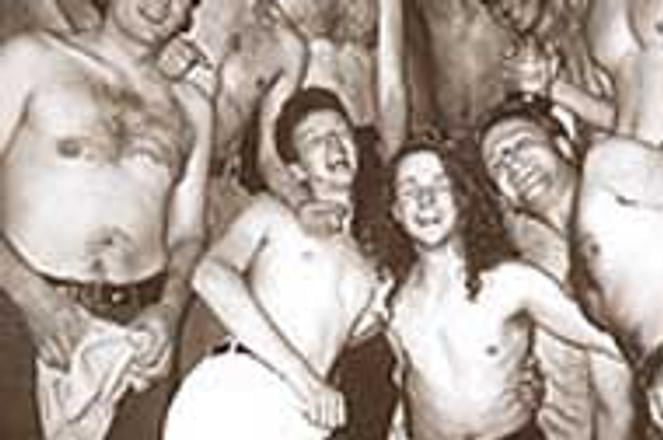Class or party time? Students learn the ins and outs of the English language at a local pub in Žilina.foto: Tom Nicholson
Among all the media 'retrospectives' inspired by the new millenium and the tenth anniversary of the Velvet Revolution, one tale was conspicuously absent: that of the expats who have passed through Slovakia in the past decade. The omission is curious, for how much richer a gallery of oddballs could any writer want?
Without doubt, most of the foreigners who have lived and worked in Slovakia for the past 10 years have not been in the least odd, and have contributed handsomely to the investment and intellectual capital the country has amassed since 1989. But given the rather specific emotional attributes of people who exchange home and hearth for lives as expats - self-sufficiency, independence, open-mindedness and a taste for adventure - the foreign community in Slovakia has naturally known more than its fair share of characters.
There's the pot-bellied Arkansan who arrived in 1992 to teach English armed only with a massive bible (King James version) and a thumping slice of religious zeal. "Ah'm gonna teach from the good book," he promised at an orientation session. "There's plenny a purty language in them Psalms." His students are probably saying 'woe unto thee, Gideon' to this day, and wondering in what context 'spake' should be used.
Then there was the dour Scandinavian who, unable to land a job teaching English, made a living betting on second-division European football matches. Once, to boost his income, he brought from home almost a hundred mobile phones that he hoped to dispose of at a profit in Bratislava.
Despite the appetite of the local market, however, these handsets proved a tough sell, mainly because the read-out was in Norwegian. "Ach," he would exclaim, "vott am I going to do viz a hundred telephones?"
Or the wayward Canadian who, as soon as he received his teaching salary, would head straight to the Irish Pub and blow the whole wad on drinks for his friends, in a creditable imitation of Mickey Rourke in Barfly. The rest of the month would be spent in deep penitence and in deep debt to his students.
Most of these exuberant personalities have seemed to drift toward English teaching, which at some public sector schools remains a job demanding neither aptitude nor experience. In contrast to the classes taught by the many committed and professional foreign instructors operating in the country, the sessions run by these free spirits take students into realms of pedagogy where no man has gone before.
The joke 'lesson plans,' the laughable grammar explanations, the bumbling improvisation, chaos and confusion of those classes! One man's idea was to have his students translate long tracts of Shakespeare into modern English; the group spent agonising hours thinking of colloquial equivalents for 'firkin' and 'bodkin.' Another planned (and clung obstinately to) a semester of discussion topics such as 'The Difference Between Comedy and Tragedy' and 'Sex, Power and Gender' for a class whose English skills were defeated by words like 'bus,' 'floor' and 'hot.'
Yet another introduced herself to her speechless students by singing God Bless America, quivering hand over heart and eyes shut in fervour. Behind the closed doors where these missionaries held forth, it often seemed as if system and method had been consciously avoided, and useful knowledge discarded for the tag-ends of Western culture.
Many Slovak students remember these oddball lecturers with fondness and wry amusement, for they meant well, and often made up in charm what they lacked in teaching skills. It was also hard to blame them for the shambles of their classes, for they received little guidance from their employers. "Go get 'em, champ!" is still the extent of most public-sector teacher training sessions, and new lecturers are thrown into 'conversation class' much as the Christians were fed to the lions.
On the other hand, some expats over the past 10 years have clearly not been in search of guidance, and settled in Slovakia precisely because there are fewer restrictions on how one lives and works than one faces 'at home'. It's no surprise that some foreigners drink more and generally feel fewer inhibitions in Slovakia, for this is a country that tolerates many forms of behaviour considered anti-social elsewhere in the world.
It's no accident, furthermore, that many of these wilder characters have ended up in public education, because state-run schools still seem to be under the impression that students will absorb English simply by being in the presence of a native speaker.
Thank God they're still around, though. How much less colourful would life have been, how much less we would have had to talk about, but for those rugged individualists who went east and not west. And despite the shambles they may have made of teaching, how tough it sometimes is to unseat them in the hearts of their former students.
Author: Tom Nicholson andDaniel J. Stoll


